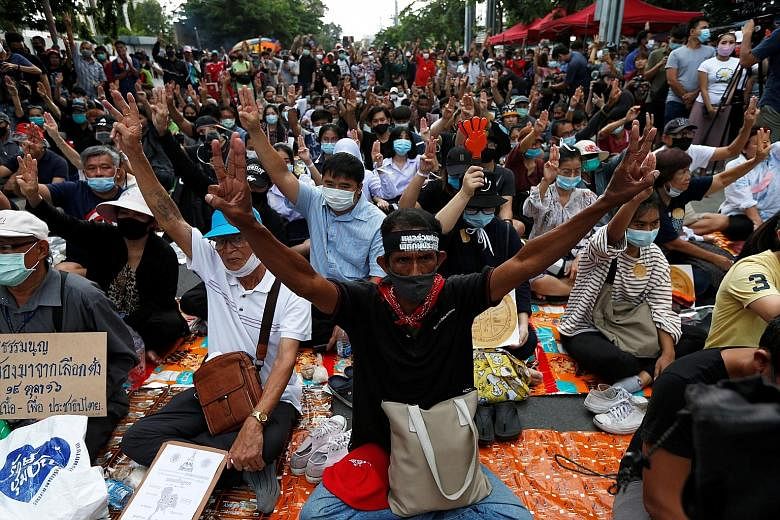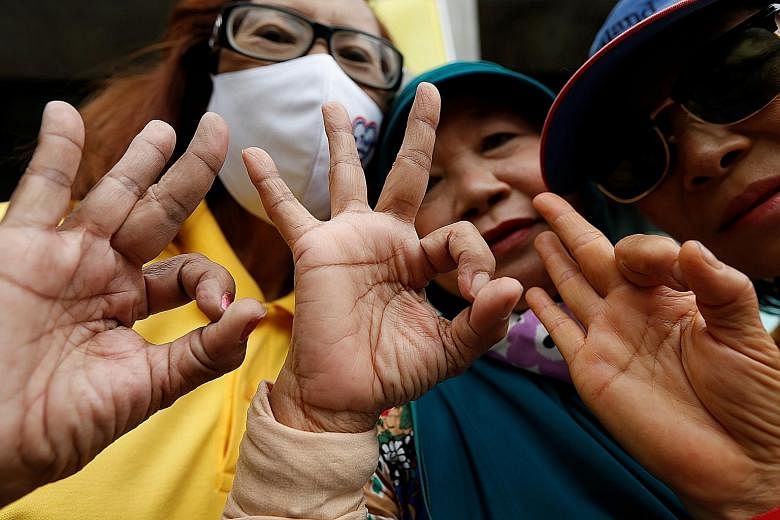A bid to amend Thailand's Constitution was thwarted yesterday after Parliament abruptly delayed a scheduled vote that could have started the drafting process.
Instead, 432 members of the 750-seat Upper and Lower Houses voted to form a special committee to study draft constitutional amendments.
The about-turn, coming after a two-day debate, enraged protesters who massed outside to pressure lawmakers for change.
Addressing the joint sitting yesterday evening, Parliament president Chuan Leekpai said: "For some of you who feel like you were cheated, there was no cheating… We do our duty with sincerity for the benefit of the country and the people."
Much of the ire was directed at the 250 senators who were largely appointed by the former ruling junta.
One-third of them are needed to back any charter amendment process to set it in motion.
Protest leader Arnon Nampa said: "If there is no progress on amending the Constitution by October, people in the rural areas, sell your rice and come to stage a long protest to chase the dictators out."
Some demonstrators even made speeches on loudspeakers from a boat in Chao Phraya River to prevent senators from leaving the Parliament complex via a nearby pier.
An amendment attempt, had it kicked off, would have lowered political temperatures amid escalating anti-government protests.
The most recent mass demonstration, over the past weekend, saw more than 30,000 people gathered in the heart of Bangkok near the Grand Palace.
Protest leaders addressed King Maha Vajiralongkorn directly from the stage and tried to submit a letter of demands to the powerful monarch.
"As long as the amendment process is ongoing, it's a release valve for the present demonstrations popping up around the country. There is hope and a venue for negotiation," Dr Khemthong Tonsakulrungruang, a law professor from Chulalongkorn University, told The Straits Times.
-
Demands of protesters
-
BANGKOK • Thailand's ongoing protests are led by a loosely structured youth-led movement which demands that the Constitution be amended, that Prime Minister Prayut Chan-o-cha step aside for fresh elections, and that the government stop harassing its critics.
It also speaks about a "dream" of having a monarch "truly under the Constitution".
One section of protesters has made 10 demands to trim the monarchy's reach, such as reducing royal spending and cutting back on publicity that overly glorifies the palace.
So far, the rallies have been peaceful.
During these protests, human rights group Internet Law Reform Dialogue (iLaw) led a drive to collect over 100,000 signatures to back a draft Bill to amend the charter.
Among other things, it sought to ensure that the prime minister is an elected lawmaker and to strip senators' power to choose a prime minister.
Under the current charter, the prime minister need not take part in elections.
The iLaw draft was submitted to Parliament on Tuesday morning, but was deemed by Parliament president Chuan Leekpai to be too late to be make it to yesterday's meeting agenda.
Instead, six other constitutional amendment motions variously put forward by the governing coalition and opposition lawmakers were debated yesterday.
One of them, backed by the governing coalition parties, seeks to create a charter-drafting assembly.
Others are motions seeking to revoke the orders issued by the former ruling junta, amend the election system and curb the Senate's powers.
Tan Hui Yee
"If you shut this down, it will raise the stakes for the next protest, and the chances of clashes would be higher."
The current Constitution is the result of two drafting attempts under the previous military government led by Prime Minister Prayut Chan-o-cha, a former army chief and leader of the 2014 coup.
It created a 250-member appointed Senate largely picked by the then ruling junta, and an electoral system that disadvantages big political parties like former election winner Pheu Thai.
The draft was approved via a national referendum in 2016, but was amended at King Vajiralongkorn's request in 2017.
The general election last year resulted in a slim victory for the current coalition government led by Mr Prayut, but also the ascendance of the youth-backed, one-year-old Future Forward Party.
It was the party's dissolution by the Constitutional Court in February this year that sparked the current wave of protests.
Legislators were due yesterday to vote on six amendment motions sponsored variously by the governing coalition and the opposition.
One of them, pushed by the governing coalition, sought to create a Constitution-drafting assembly largely elected by voters.
For the motion to have passed yesterday, it needed a simple majority from the 750-seat Parliament, and votes from at least one-third of the Senate.
Many groups have weighed in on this issue. On Tuesday, a human rights group called Internet Law Reform Dialogue submitted to Parliament what it terms a people's constitutional amendment Bill backed by more than 100,000 signatures.
On Wednesday, royalists led by former legislator Warong Dechgitvigrom had turned up at Parliament to present a list of 130,000 names who opposed any change to the charter.
Addressing the combined House sitting yesterday, Senator Somjet Bunthanom, a retired military officer, said: "I know well that if we allow a new Constitution to be drafted, it will worsen the divisions in society."
Pheu Thai MP Sutin Klangsaeng, the chief opposition Whip, argued: "If now you still do not believe this is the will of the people, have a look outside Parliament today."
Meanwhile, governing coalition legislator Satit Wongnongtoey, who belongs to the Democrat Party, tried to assure other lawmakers that attempts to amend the Constitution would not touch the role of the monarchy.
"I have hope that… we can continue to work together to clear conflict from Thai society," he said.
According to Dr Khemthong, amending the Constitution is "cumbersome, costly and ineffective" and likely to be a divisive process because of the current polarised environment.
"The proposal to create a drafting council was the easiest because everyone could postpone the hard decisions."
With that process stymied for now, the protesters have warned that they may escalate their actions.


